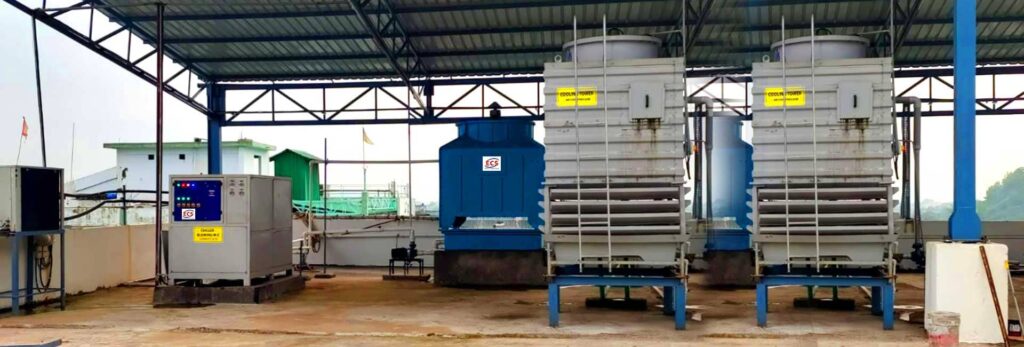Choosing the Right Glycol Chiller System for Your Business Needs
Earth Cooling System2023-09-30T10:40:51+00:00Many industrial and commercial applications use Glycol chiller systems especially when needed a precise temperature control for working conditions. Glycol chiller systems utilize a coolant which is known as glycol to cool down the process or equipment to get a desired temperature. Today we will discuss the right Glycol chiller system suitable for your business needs.
Key Factors for Choosing the Right Glycol Chiller System for Your Business Needs
– determine the cooling capacity required based on your application’s demands.
– Assess the available space for installation and the chiller’s energy efficiency to minimize operational costs.
– Evaluate the glycol concentration needed for your specific cooling requirements and check if the system offers adjustable temperature control.
– At last factor in your budget restrictions and long-term goals to make an informed decision that aligns with your business’s cooling needs.
It's Capacity and Load Calculation
– Start by assessing the total heat load your equipment generates.
– Estimate factors like ambient temperature, insulation, and the specific heat load of your processes.
-Once the heat load is determined, add a safety margin to account for unexpected variations.
– Calculate the glycol flow rate needed based on the load and desired temperature differential.
-Ensure the chiller’s capacity matches or exceeds this requirement.|
– Exact capacity and load calculations are important to prevent under- or over-sizing, optimizing efficiency and cost-effectiveness in your glycol chiller system.
Glycol chillers and air-cooled chillers are two separate cooling systems
GLYCOL CHILLERS:
– Glycol chillers use a glycol-water mixture to provide exact and constant temperature control, making them ideal for processes demanding stable, low-temperature environments, such as breweries or pharmaceutical manufacturing.
– They’re efficient but require additional maintenance due to the glycol fluid.
AIR-COOLED CHILLERS:
– Air-cooled chillers disband heat using ambient air, making them simpler to install and maintain.
– They suit applications with medium cooling needs like HVAC systems. However, they struggle in extreme climates and lack the temperature exactness of glycol chillers.
– The choice depends on your specific requirements, energy costs, and environmental conditions.
Types of Glycol Chiller Cooling System, Item and Cost
Glycol cooling system components include the chiller’s unit, storage of its tank, pumps, control systems, and heat exchangers.
The cost of a glycol cooling system varies on the basis of factors such as cooling capacity, brand, features, and installation requirements.
We should always hook to the factor of long-term operational expenses to determine the most cost-effective solution for your specific glycol cooling needs.
Why you should Choose the Glycol Chiller System
There are many reasons but some important reasons,
– It provides precise temperature control critical for industries like food processing, pharmaceuticals, and brewing, preventing product spoilage or quality issues.
– Investing in a high-quality glycol chiller system provides peace of mind, improves product quality, and delivers long-term cost savings, Choose as we provide the best Glycol Chiller System in Delhi making it a careful choice for businesses with critical cooling needs.
– Top-tier systems are energy-efficient, reducing operational costs and environmental impact. They also offer robust reliability, minimizing downtime and maintenance expenses.

Note From Earth Cooling System: Glycol chiller system
When choosing a glycol chiller system there are some important points that you should keep in mind,
What you should do:
Determine your cooling requirements like temperature range and capacities. Work with experienced professionals who can design the system according to your specific needs. And always go for quality equipment that has longevity and reliability. Schedule time period for cleaning, filter replacement, and glycol concentration checks. Maintain correct Glycol to water ratio to prevent freezing and overheating.
Things you should avoid:
– Make sure the installation is properly done to prevent leaks or performance problems.
– Never ignore glycol quality, always use high-quality glycol with proper inhibitors to prevent corrosion.
– It’s always a bad idea to neglect the size of the chiller it can lead to operational issues.
– Provide proper ventilation so that the heat can go away.
– Do not avoid maintenance, skipping route maintenance can lead to expensive repairs.
Frequently Asked Questions: (FAQ)
Ques) What is the purpose of a glycol chiller?
Ans. It serves an important role in many industrial and commercial applications, mainly within the field of refrigeration and temperature control. The main purpose of a glycol chiller is to maintain exact and stable temperatures in processes that require strict temperature regulation.
Ques) How much glycol do I need for my chiller?
Ans. It depends on points like the chiller’s capacity, needed temperature, and surrounding conditions. From 20% to 50% glycol by volume glycol is mixed with water at different ratios, with common concentrations running.
Ques) What are the advantages of glycol chillers?
Ans. Glycol chillers maintain consistent and accurate temperatures. Prevents pipelines and equipment from freezing. They contain corrosion Inhibition and extend the lifespan of the chiller and system reliability. And also has Heat Transfer Efficiency
Ques) Do you need a glycol chiller?
Ans. We need a glycol chiller when we need to control the precise temperature in factory work. And in need of freeze protection in cold environments, as well as to operate sensitive equipment that is affected by temperature fluctuations.
Ques) What is the temperature limit for glycol?
Ans. High temperature up to 350 degrees Fahrenheit is the temperature limit for glycol. And sometimes varies in exceptional situations and the temperature limit for glycol depends on its concentration.


